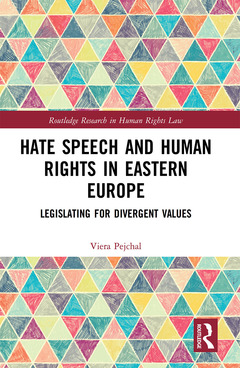Hate Speech and Human Rights in Eastern Europe Legislating for Divergent Values Routledge Research in Human Rights Law Series
Auteur : Pejchal Viera

Hate Speech and Human Rights. Democracies need to understand these terms to properly adapt their legal frameworks. Regulation of hate speech exposes underlining and sometimes invisible societal values such as security and public order, equality and non-discrimination, human dignity, and other democratic vital interests.
The spread of hatred and hate speech has intensified in many corners of the world over the last decade and its regulation presents a conundrum for many democracies. This book presents a three-prong theory describing three different but complementary models of hate speech regulation which allows stakeholders to better address this phenomenon. It examines international and national legal frameworks and related case law as well as pertinent scholarly literature review to highlight this development.
After a period of an absence of free speech during communism, post-communist democracies have sought to build a framework for the exercise of free speech while protecting public goods such as liberty, equality and human dignity. The three-prong theory is applied to identify public goods and values underlining the regulation of hate speech in the Czech Republic and Slovakia, two countries that share a political, sociological, and legal history, as an example of the differing approaches to hate speech regulation in post-communist societies due to divergent social values, despite identical legal frameworks.
This book will be of great interest to scholars of human rights law, lawyers, judges, government, NGOs, media and anyone who would like to understand values that underpin hate speech regulations which reflect values that society cherishes the most.
Foreword By Jiri Priban;
Chapter I: Introduction;
Part I: Theoretical Framework;
Chapter II: Hate Speech Regulation In Democracy;
Chapter III: Historical, Political And Constitutional Context Of The Czech And Slovak Republics;
Part II: International Responses To The Regulation Of Hate Speech;
Chapter IV: The United Nations’ Treaty Response To Regulation Of Hate Speech;
Chapter V: European Responses To Hate Speech Regulation;
Chapter VI: International Soft Law And The Regulation Of Hate Speech;
Part III: The Czech And Slovak Frameworks On The Regulation Of Hate Speech;
Chapter VII: Dawn Of The Post-Communist Regulation Of Hate Speech;
Chapter VIII: Post-Communist Penal Regulation Of Hate Speech;
Chapter IX: General Conclusion;
Viera Pejchal (Ph.D) is a Human Rights Officer at the United Nations. She was an active member of the ‘No Hate’ Council of Europe Youth Campaign, and has participated in many international conferences and lectured on human rights law. She has published extensively on hate speech and human rights in international academic journals and about extremism and democracy in Slovak newspapers and blogs.
Date de parution : 12-2021
15.6x23.4 cm
Date de parution : 05-2020
15.6x23.4 cm
Thèmes de Hate Speech and Human Rights in Eastern Europe :
Mots-clés :
Hate Speech; Young Man; Hate Speech Regulation; Human dignity; Hate Speech Laws; Human rights; Combating Hate Speech; Values; Hate Motivated Conduct; Democracy; Czech Constitution; Eastern Europe; Part Iii; Post-communism; Racial Hate Speech; International public law; Online Hate Speech; European Union; Hr Committee; United Nations; Hate Speech Cases; Czech Republic; Hate Crime; Slovakia; Slovak Constitution; Extreme Speech; Soft Law Documents; Hate Motivated Violence; United Nations Human Rights Law; Rabat Plan; Banning Hate Speech; United Nations Human Rights Treaties; Mill’s Harm Principle; Slovak Courts; Czechoslovak Socialist Republic; Key Postulate



